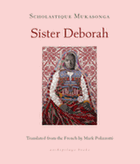
Scholastique Mukasonga again sharply and profoundly explores the spiritual realm in Sister Deborah. She also reunites with Mark Polizzotti, who translated Kibogo, her 2022 National Book Award finalist. Mukasonga, a Rwandan refugee living in France since 1992, deftly layers her mystical narrative with the consequences of white occupation (Belgian, mostly, but also German and American), the clash between invasive Christianity and indigenous practices, and struggles for female autonomy.
Four chapters compose Mukasonga's slim novel, each presented with first-person agency. Three belong to Ikirezi, "a little peasant girl [who] became the great Professor Jewels." Ikirezi is a sickly child, taken by her mother--against her father's demands--"to the mission of the black padri," situated on a pagan ceremonial site, where Sister Deborah will know "what is best for her." Ikirezi recovers and proves herself an outstanding student, becoming an "eminent Africanist" with a Howard University doctorate. Convinced that Sister Deborah's "unknown mysterious power" enabled her, Ikirezi returns to Africa seeking her benefactor. Mukasonga reserves the third chapter for Sister Deborah herself: "Listen carefully," she warns Ikirezi, "and if one day you turn [my story] into one of your books, woe unto you if you leave out a single word."
At under 150 pages, Mukasonga doesn't need loquaciousness to achieve affecting density. Ikirezi and Sister Deborah's trajectories--Africa to America for the former; America to Africa for the latter--are superbly engaging stories, while their experiences also adroitly (never didactically) expose widespread disparities and inequities of race, gender, history, society, and religion. Mukasonga skillfully elevates her storytelling into enriched enlightenment. --Terry Hong

